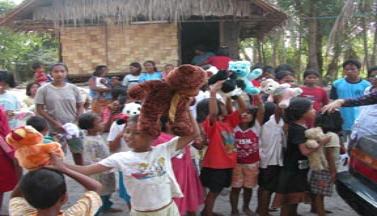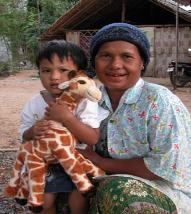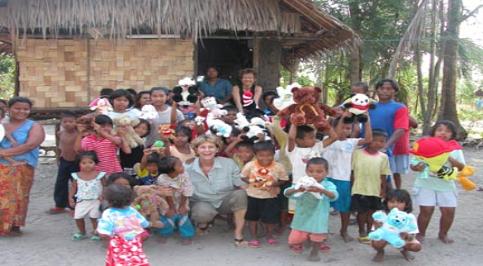Toys for Thailand Trauma Children
100 Days of Tsunami Memorial

100 Days of Tsunami Memorial


Judy Eberhart and Sasha Bilar returned safely from Thailand and shared their pictures and travel stories with us.
What an amazing adventure Judy and Sasha had delivering 600 pounds of stuffed animals (collected mainly from Palomar employees) to the Tsunami orphans in remote southern Thailand by the help of Thai Airways for no cost.
Judy and Sasha want you to know that your support and donations made a difference in the lives of many children. Your help is still needed. If you would like to make a financial contribution, your assistance will directly assist us on going help with trauma children and the Thai orphanages. Tax deductible donations can be made to: Toys for Thailand.
Big Thanks to The Thai airways staff from LAX, Bangkok and Phuket for their “smooth as silk” service. Thanks to Thai Airways, we were able to do what we did for these children.
If your vacation destination is Thailand, Please fly Thai Airways. Contact us if you want to visit the island and the children.

Aug. 1, 2005 Ashland native Judy Eberhart, center, stands with excited children who had just been given stuffed animals as part of a relief effort.
Twenty-two boxes, two duffels and two women on a mission to Thailand to bring little fuzzy creatures to children to hug in the night when they feel afraid — that was the beginning.
We couldn’t have done it without help from so many. Sasha’s husband, John, helped box up the toys, drive us to the LAX airport and put up with her endless phone calls to Thailand to make arrangements.
Thai Airlines shipped our little caravan of goodies free of charge. Sasha’s friend, Ta, met us at the airport at midnight the night of another 8.7 earthquake. Not sure that Phuket, our destination, would be safe, we waited until the next day for another plane ride to the island where most of the destruction occurred. The immigration fellow ushered us through the diplomatic checkpoint without having to stop. The next day the boxes were delivered to the guest house of Khun Ying Supinda, the head of a large charity organization and a cousin of the royal family. She put us up for five days in her lovely guesthouse with a view of the ocean. Her assistant, Pi, and driver, Oat, drove us to schools, resettlement camps and villages.
The first sight of the devastation of the luxury resort beaches took our breath away. It looked like a war zone. The military ship was still on the side of the hill as a reminder of how far the wave went, about 3 kilometers. Much has been cleared away but there still remains mangled and twisted buildings.
As we drove to various locations we saw the volunteer camp where 150 people from 30 countries around the world are staying while they help clear and rebuild. There was a new Tsunami Bar and Grill looking strangely out of place that had a booming business for the volunteers and tourists going to the area.
The town of Phuket, on the island of the same name, is a popular tourist area where there is also major rebuilding, but many buildings are still boarded up. There is a Starbucks which is packed, just like at home, and next door the McDonald’s is still fenced in. One building is said to still have bodies in the basement that cannot yet be removed. The army is just now taking down the huge tents near the airport, which were filled with donated goods from around the world.
The economy is hurt in so many ways with 90,000 jobs lost. People who work in the large resorts lost their jobs, if not family members and homes. Fishermen lost boats and nets, although there have been contributions from Sweden and the King of Thailand to get them boats again. We met a couple representing a church in Canada in a resettlement camp who were planning to use money from the church members for boats and nets for the Moken fishermen.
Many tourists are going elsewhere for the holidays. Last week there were three bombs in southern Thailand, and that is adding an additional scare for the tourists.
The numbers we read in the newspaper — 5,000 lost or missing, 2,500 unidentified bodies — lets us know it is a tragedy, but it is the people we met who have made these numbers meaningful. The lady on the beach who used to massage tourists for a living and now cannot support her three kids; the fellow whose wife was killed and now he must take care of his two children and recover his life as a fisherman; the child who lost her mother and father who is destined for an orphanage because her auntie cannot care for her after losing her job as a worker in the hotel and has four of her own kids to support and no husband — these are some of the stories, and people we will try to help through Khun Ying’s organization. She is dedicated to work on the local level and to get help where is it needed.
I noticed signs of help from many countries — the makeshift morgue from Norway, the DNA testing by the Chinese, a computer lab in a school by the Koreans, boats from Sweden, new housing from France and others. I asked Khun Ying, what about the United States? I know that millions have been donated, but there are no signs of that. She said, “That is the million dollar question.” Maybe it was sent to another country? Maybe it is hung up in red tape? Wherever it went, it is not publicized.
That is why it is so important to us to be here and see what is happening, ask questions and make our little contributions count.
There is also corruption, just as there was following 9/11. Some people have figured out the system and how to get lots of help; others have fallen through the cracks. We want our help to go to those people who have fallen through the cracks. Khun Ying is also dedicated to help these people and their villages. She will be our watchdog for any money we send.
The Teddy Bear Express has turned into Teddy Bear Diplomacy, as well as a teaching tool. Sasha, a professional artist, helped the women at the resettlement camp with baskets they planned to sell on eBay as “Survivor Crafts.” She showed them how a little flower or design would make the baskets more appealing for the farang (foreigners). She gave mini lectures to the children about taking care of the environment and cleaning up the beaches, about greed and how the bigger kids should stand at the end of the line and get the smaller toys so the little kids would have something substantial to hug.
It is not just the children, however, who have sleepless nights. While we were in a Moken village, there was some shouting and people running. People are on hyper-alert. The night we arrived, the news of the last earthquake sent tourists and locals alike into the hills.
Puchong, Sasha’s friend, an international lawyer who has been helping Khung Ying and many people gratis, traveled with us and Piep, another of Sasha’s friends who is a native of Phuket Island, as we distributed toys to the children. Puchong took us to Tapla, a Moken village. With great enthusiasm he showed us the first toilet — ever; electricity; a new net for crab catching; and a new hut that he helped them build. Sasha gave granny $120 so that she could also get a new hut. Hers was on its last leg. Puchong told them that we would return and if they didn’t put the money to good use, there wouldn’t be any more. It is important that the people help themselves and that not everything is going to be given to them. Some villages on the main route got so much and seemed to have a “gimme” attitude, which we picked up very quickly.
We returned the next day unannounced with treats, toys and flip flops for the kids without shoes. Work had already begun to tear down granny’s shack, and the fisherman showed us his first crab catch since the tsunami. A chef from a restaurant in town was there making a purchase. As we left, a woman brought us a bag of freshly roasted cashews as a gift. We were all touched by this village and decided to “adopt” it. Not an official contractual deal, just folks we wanted to follow up on and bring them help they might need. I gave Khun Ying the money that was given to me for the project, which she will distribute to care for the kids of the crab catcher. She said it would help the entire year.
One day on our tour to a resettlement camp, we passed the “Dead Bodies Recovery,” a makeshift morgue and nearby “Wall of Remembrance,” where countries were listed that had lost people. On the wall were pictures of people who had perished or were still missing. There were still 2,500 bodies unclaimed. At one time, 180 people were working with this center. Now it was a very small crew of folks mostly resting.
There was also a monk in residence and a temporary place for folks to come by and receive blessings. Whether you are Buddhist or not, it is a comforting blessing. At the wall we all were overcome with tears. As we drove off, I had to pull over to the side of the road to throw up. It was an intense experience!
On a lighter note, we visited Ning Nong, an elephant Sasha’s daughter had remembered from a previous visit. After searching four or five places, we found Ning Nong. She is a 4-year-old elephant who gives rides to kids on the beach. She is a heroine these days, having saved two kids riding her before the wave came. She sensed something, screamed and ran off into the hills, saving the girls. When we found her in her pen, she was eating with an elephant friend. The trainer took the chain off her leg and she performed a few tricks for us. The best was when she put her trunk around our neck and made kissing sounds on our cheeks. I think I am in love!
The sights of walls blown out in classrooms and water still on the floor, villagers living in resettlement camps under tin roofs that make the one room oven-like, the courage of people who have helped, the international community and tourists who helped clean up their hotel if it had anything left, the passion of local Thais who have committed to help — there are so many impressions, some heartwarming, others very difficult.
As Khun Ying said, “We are all changed since the tsunami. Thailand will not be the same.” And neither will we.
I feel very grateful to Sasha and her friends who have taken me, shown me, provided for me and extended me wonderful hospitality and kindness. I have been very lucky to be the photojournalist for our Toys for Thailand project.
Writer Judy Eberhart and other volunteers went to Thailand in the spring giving toys and support to children and their families who were affected by the Dec. 26, 2004 tsunami.